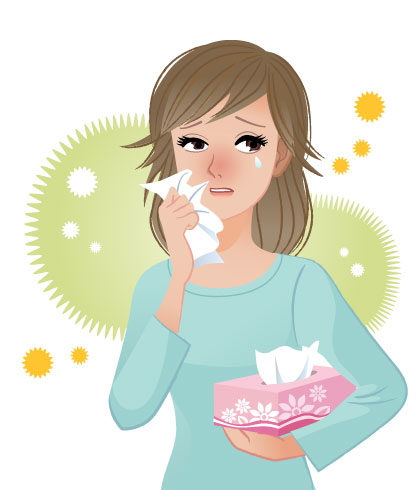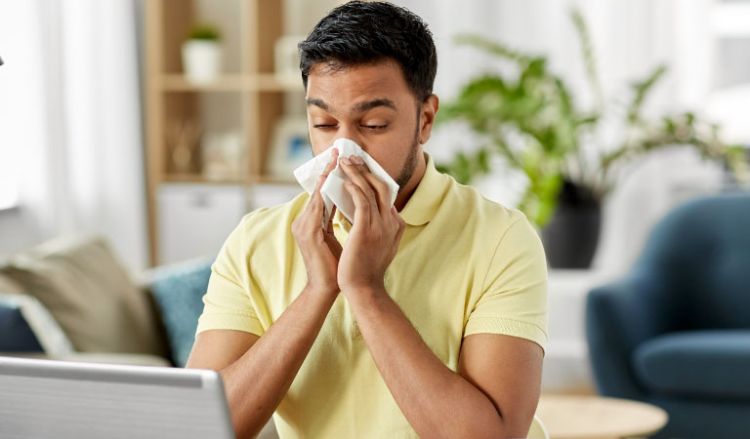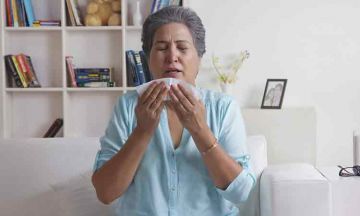Healing Allergic Rhinitis Symptoms with Homeopathy This Spring
Spring is a season in which beautiful flowers bloom. The blooming of these flowers also releases pollens and that is the most common trigger for allergic rhinitis. As per the study by The National Center for Biotechnology Information (NCBI), about 10-20% of the Indian population suffers from allergic rhinitis.
Allergic rhinitis is caused by a complicated interaction of environmental and genetic elements. Immune system abnormalities can cause respiratory problems and have a negative impact on your daily life.
Book an appointment now!
What is Allergic Rhinitis?
Allergic rhinitis, is a condition in which the mucosal membrane of the nose becomes inflamed. It is an allergic response of the upper respiratory tract.
According to The World Allergy Organization (WAO), about 400 million people suffer from allergic rhinitis around the world, and many are largely undiagnosed or untreated. It is one of the most common ailments nowadays, causing sleep disturbances, irritation, exhaustion, and lowered job efficiency.
What are the allergic rhinitis symptoms?
- Excessive fatigue
- Stuffy nose
- Coughing
- Sore or scratchy throat
- Sneezing
- Runny nose
- Itchy nose
- Sore or scratchy throat
- Itchy eyes
- Watery eyes
- Dark circles
- Frequent headaches
- Eczema-type symptoms, such as having excessively dry, itchy skin that might blister and weep
 Allergic Rhinitis Causes
Allergic Rhinitis Causes
The allergic rhinitis causes depend on the type of allergen that triggers the symptoms.
; Antibodies and the chemical histamine are released when your immune system is exposed to pollen. Most common allergy symptoms are caused by the histamine response.
- If the allergic rhinitis symptoms are triggered due to pollens from flowers, trees grass or weed then it is called seasonal allergic rhinitis.
- If the allergic rhinitis symptoms are triggered due to dust mites, pet dander or molds then it is termed as perennial allergic rhinitis.
- If the allergic rhinitis symptoms are triggered due to work environment such as working in a chemical factory or wood workshop, then it is termed as occupational allergic rhinitis.
What is Seasonal Allergic Rhinitis?
You most likely have seasonal allergic rhinitis if you only get allergy symptoms during specific seasons of the year. These allergies, often known as hay fever, are caused by your body’s reaction to plant pollen or other airborne allergens such as mould spores that you've inhaled.
Your immune system responds by releasing a variety of molecules that are designed to not only protect you from the perceived "invaders" but also create the inflammation that triggers allergic rhinitis symptoms.
What is Perennial Allergic Rhinitis?
You may have perennial allergic rhinitis if you have chronic allergic rhinitis symptoms for an extended period. The symptoms are comparable to seasonal allergic rhinitis, but they occur more frequently.
When your immune system overreacts to allergens that are prevalent in your surroundings all year, you get perennial allergic rhinitis. This is why your symptoms persist over time rather than appearing only during certain seasons.
Dust mite droppings and animal dander, especially from household pets like cats and dogs, are the most common allergens that cause perennial allergic rhinitis. Mold, houseplants, and carpeting are all possible triggers.
The symptoms of mild allergic rhinitis may go away on their own within a few days. However, if you have severe allergic rhinitis symptoms, it could be a sign that you're developing asthma.
You can take our allergy evaluation test to analyze the level of your allergies.
Allergic Rhinitis Tips
According to NCBI, allergic rhinitis may be genetic; the best course of action is to do everything you can to avoid a reaction.
A combined approach is always helpful for faster recovery from allergic rhinitis.
Here are a few easy things you can use as preventive tips.
- The fur shed by a pet is also an allergen. If you have pets in the house then it is advisable to bathe your pet at least once in 15 days to reduce the allergy caused by your pet.
- Clean curtains and sofas regularly, house dust mites are one of the causes of allergic rhinitis. They settle on the curtains and sofas and bring on an attack of sneezing as soon as the person suffering from allergic rhinitis comes in contact with it.
- Clean the windows; dust bookshelves; wash bedsheets and pillow covers on a regular bases, keep restrooms dry after each use, as mold thrives in damp environments and is a known trigger of allergic rhinitis.
- Don’t only vacuum clean the house but keep the vacuum cleaner clean too.
- Unwashed vessels and dirty sinks are a breeding ground for cockroaches. Keep the kitchen clean and tidy to prevent cockroaches, reduce allergic rhinitis and keep the gut normal.
- Patients suffering from allergy issues should take care and stay away from freshly painted environments to prevent an attack of allergic rhinitis.
Allergic rhinitis treatment with homeopathic medicine
Allergic rhinitis is the response of a weak immune system to a variety of allergens.
Most conventional treatment methods aim at relieving only the symptoms and can also cause side effects. The side-effects can include headaches, sinus pain, a sore throat, vomiting, a dry mouth, drowsiness or confusion.
Homeopathic treatment is natural, safe, and side effect free. It is focused on the physical, emotional, and psychological well-being of the patient. Many of the allergic rhinitis symptoms might be confused with those of other illnesses, so it's critical to make the right diagnosis.
Homeopathic medicine for allergic rhinitis reduces the frequency and duration of its attacks as compared to the attacks experienced before treatment. It is well recommended for chronic complaints and the prevention of future complications.
Allergic rhinitis treatment in homeopathy aims at boosting the immune system of the patients..
Homeopathic medicine for allergic rhinitis does not create a dependency, unlike conventional medicines. According to a study by The Journal of Alternative and Complementary Medicine (TJACM), 25% of allergic rhinitis cases has shown positive effects from homeopathic treatment.
Homeopathy can be considered the best treatment for allergic rhinitis because it has a curative approach rather than a suppressive approach.
At Dr Batra's® Healthcare the homoeopathic doctor plans a personalized treatment using the medical science of homoeopathy. This approach includes homoeopathic medicines for allergies as well as lifestyle suggestions for the patient's total recovery.
Dr Batra's® has introduced the latest in natural, non-steroidal, side-effect-free allergy treatments, which include a comprehensive allergy evaluation and homoeopathic nebulizer that can help you get rid of your respiratory allergies. You won't have to hurry to the hospital in a panic or be concerned about the long-lasting effects of steroids for you or your child.
As authenticated by American Quality Assessors Dr Batra's® Healthcare has 96.3 percent success rate in treating respiratory issues, including allergic rhinitis diseases. Get a personalized, effective, and safe treatment for all of your allergies.
Book an appointment now!
Also read: Treat your allergies with homeopathy




